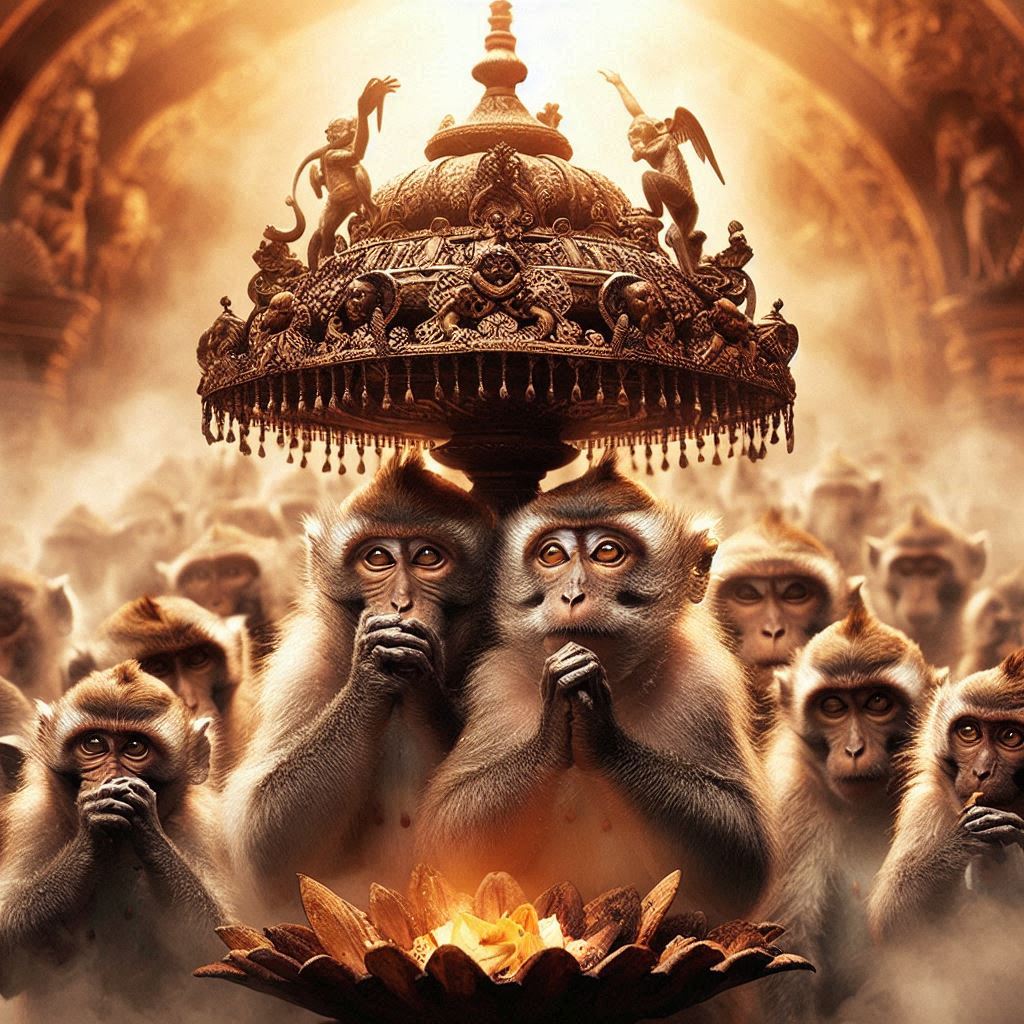
Do Monkeys Worship a Higher Power? – Examining Religious Rituals Where Monkeys Are Seen as Sacred Beings
Share
Do Monkeys Worship a Higher Power? – Examining Religious Rituals Where Monkeys Are Seen as Sacred Beings
Monkeys have long held a special place in various cultures around the world, often revered for their intelligence, playfulness, and close resemblance to humans. In some societies, they are seen as more than just animals; they are considered sacred beings, revered in religious contexts, and sometimes even worshipped. While monkeys themselves are not typically seen engaging in formal religious rituals or worshiping higher powers in the way humans do, many cultures have incorporated them into their spiritual practices, elevating them to a divine status. So, do monkeys worship a higher power, or is it humanity that has ascribed sacredness to these primates? Let’s explore the intriguing relationship between monkeys and religious worship, where they are often seen as sacred beings in their own right.
1. Monkeys as Sacred Beings in Hinduism
In Hinduism, monkeys hold a significant place in mythology and religious practices, with the most famous being Hanuman, the monkey god. Hanuman is a central figure in the ancient Indian epic Ramayana, where he is depicted as a devoted follower of Lord Rama, a prince and an incarnation of the god Vishnu. Hanuman is revered for his strength, loyalty, and selflessness, and is seen as a divine figure who possesses the qualities of both a warrior and a wise sage.
Devotees of Hanuman often visit temples dedicated to him, where monkeys are sometimes seen roaming freely, regarded as sacred animals. In fact, in many parts of India, monkeys are treated with a great deal of respect. In some regions, feeding monkeys is seen as an act of devotion, and they are often given offerings such as fruit or sweets as part of religious rituals. The temples and shrines dedicated to Hanuman are often places where monkeys are allowed to live and interact with worshippers, symbolizing the close connection between the divine and the animal world.
While monkeys themselves may not be worshipping a higher power, their association with Hanuman elevates them to a revered status in Hinduism. In this context, the idea of monkeys worshipping a higher power is more about humans honoring monkeys as sacred animals through their devotion to the divine figure of Hanuman.
2. The Monkey God and Human Connection
The reverence for monkeys in Hinduism is not limited to Hanuman alone. In some regions of India, monkeys are viewed as symbolic of spiritual qualities such as agility, intelligence, and playfulness, all of which are seen as desirable traits in the pursuit of spiritual enlightenment. Monkeys’ ability to adapt to various environments and their resourcefulness are qualities that many followers of Hinduism admire and seek to embody in their own lives. As a result, monkeys are often associated with certain gods and goddesses, seen as intermediaries between the divine and the earthly realm.
In some spiritual traditions, the act of feeding or protecting monkeys is thought to bring good fortune or blessings. This belief ties into the broader concept of karma, where acts of kindness toward sacred animals, like monkeys, are believed to have positive spiritual consequences.
3. Buddhism and the Reverence of Monkeys
In Buddhism, monkeys are also regarded as sacred beings, but their role is slightly different from their status in Hinduism. While they may not be worshipped as divine figures, monkeys are often seen as symbolic of important Buddhist teachings. The story of the Jataka Tales, which recounts the previous lives of the Buddha, includes many stories where the Buddha is reborn as a monkey. In these stories, the monkey’s intelligence and compassion often play a central role in helping others, teaching lessons about selflessness, wisdom, and moral conduct.
Monkeys are frequently depicted in Buddhist art and iconography, and in some Buddhist temples, especially in countries like Thailand and Sri Lanka, they are treated with reverence. In these places, monkeys are sometimes seen as embodiments of virtues such as generosity and compassion, and in certain locations, it’s considered auspicious to feed or protect monkeys.
While Buddhists may not worship monkeys in the way Hindus revere Hanuman, the symbolic role of monkeys in Buddhist teachings elevates them to a status of respect and admiration. This respect is reflected in the care and protection given to monkeys in certain Buddhist regions.
4. Monkeys in Other Religious Practices Around the World
While Hinduism and Buddhism are the most well-known religions that revere monkeys, other cultures and religions also incorporate monkeys into their spiritual beliefs. In some African traditions, monkeys are believed to have special powers or to be intermediaries between the human world and the spirit world. In some West African cultures, monkeys are seen as spiritual beings that possess knowledge of the unseen world and are capable of guiding humans in their spiritual journeys.
In some indigenous cultures in South America, monkeys are associated with fertility and abundance. The monkeys’ playful nature and their connection to the natural world have led to them being seen as symbols of life, growth, and vitality. In these traditions, monkeys may be honored in rituals or festivals as a way of ensuring a good harvest or maintaining balance in the ecosystem.
5. Monkeys in Popular Culture and Spirituality
In addition to religious and cultural beliefs, monkeys have also found a place in modern spirituality and popular culture. In the West, monkeys are often seen as symbols of playfulness, curiosity, and mischief. The concept of monkeys being spiritual beings, or even participating in their own form of worship, is more of a humorous or metaphorical idea in Western thought, but it’s still intriguing to consider how these animals are imbued with deeper meaning in various global spiritual practices.
The notion that monkeys themselves could be engaging in religious practices, however, is not widely supported by scientific evidence. Monkeys are intelligent creatures, but their behavior is largely driven by instincts, social structures, and survival needs rather than any kind of formal worship. However, the idea of monkeys as sacred beings in religious rituals speaks more to how humans view and revere these animals than to any actual religious practices carried out by the monkeys themselves.
6. Conclusion: The Sacredness of Monkeys in Human Culture
While monkeys themselves may not worship a higher power, the role they play in human religious practices and spiritual beliefs is undeniable. From the Hindu reverence for Hanuman to the symbolic role of monkeys in Buddhism, these animals have been elevated to a position of sacredness in many cultures. Monkeys are seen as embodiments of virtues like playfulness, intelligence, and devotion, and in some traditions, they are even honored with offerings and care as part of religious rituals.
Ultimately, the idea that monkeys worship a higher power is more of a reflection of human culture than the monkeys themselves. They are revered for their qualities, their intelligence, and their close resemblance to human beings. Whether they’re seen as divine beings or symbols of important spiritual virtues, monkeys remain an integral part of religious and cultural practices around the world, embodying a connection between the animal world and the divine.
CyberMutz.com (Dog-Themed Apparel & Accessories)
“CyberMutz.com – Explore a unique collection of dog-themed apparel, accessories, and gifts for pet lovers. Shop stylish, high-quality designs featuring your favorite dog breeds!” Category Page Descriptions: Dog Breed T-Shirts: “Show off your love for dogs with our exclusive breed-themed T-shirts. From German Shepherds to Chihuahuas, find high-quality, comfortable tees celebrating your favorite pup!” Dog Breed Pet Tank Tops: “Keep your furry friend stylish and comfortable with our dog breed-themed pet tank tops. Perfect for small and large dogs, these unique designs are a must-have!” Funny Dog-Themed Apparel: “Love dogs and humor? Our funny dog-themed apparel blends style with witty canine-inspired designs. Shop now for T-shirts, hoodies, and more!” Personalized Dog Merchandise: “Customize your dog lover’s gear with our personalized pet-themed apparel and accessories. Create a one-of-a-kind look for yourself or a perfect gift for a fellow dog enthusiast!”
CyberPussyKatz.com (Cat-Themed Apparel & Accessories)
“CyberPussyKatz.com – Celebrate your love for cats with our premium collection of feline-inspired apparel and accessories. Purr-fect designs for every cat lover!” Category Page Descriptions: Cat Breed T-Shirts: “Showcase your favorite feline friend with our stylish cat breed-themed T-shirts. From Maine Coons to Siamese, find the perfect tee for cat lovers!” Funny Cat-Themed Apparel: “Express your quirky side with our funny cat-themed T-shirts, hoodies, and more. Pawsome designs for those who love cats and humor!” Personalized Cat Merchandise: “Make it personal with custom cat-themed apparel and accessories. Create a unique gift or a special piece just for you!”
CyberMunkiez.com (Monkey-Themed Apparel & Accessories)
“CyberMunkiez.com – A fun collection of monkey-inspired apparel and accessories. Perfect for primate lovers who enjoy bold, playful, and unique designs!” Category Page Descriptions: Monkey-Themed T-Shirts: “Go bananas over our monkey-themed T-shirts! Whether you love capuchins, chimps, or gorillas, our designs bring out your wild side.” Funny Primate Apparel: “Add a touch of humor to your wardrobe with our hilarious monkey and ape-inspired apparel. Great for animal lovers and jungle enthusiasts!” Custom Monkey Merchandise: “Make it yours! Personalize your favorite monkey designs on T-shirts, hoodies, and more for a one-of-a-kind look.”
